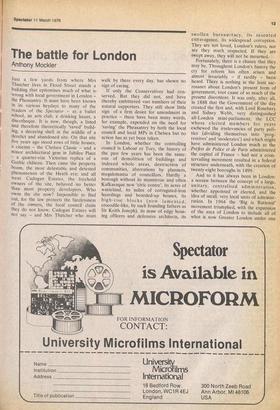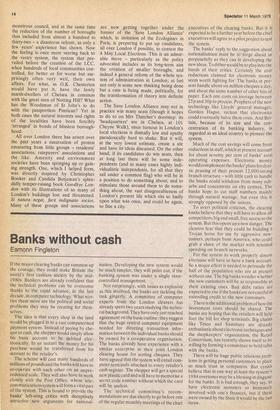The battle for London
Anthony Mockler
Just a few yards from where Mrs Thatcher lives in Flood Street stands a building that epitomises much of what is. wrong with local government in London — the Pheasantry. It must have been known in its various heydays to many of the readers of the Spectator — as a ballet school, an arts club, a drinking haunt, a discotheque. It is now, though, a listed and therefore theoretically 'saved' building, a decaying shell in the middle of a derelict and abandoned site. On that site five years ago stood rows of little houses, a cinema — the Chelsea Classic — and a minor architectural gem in Jubilee Place — a quarter-size Victorian replica of a Gothic château. Then came the property boom, the most detestable and detested phenomenon of the Heath era; and all went. Cadogan Estates, the freehold owners of the site, behaved no better than most property developers. Who owns the site now? Impossible to find out, for the law protects the facelessness of the owners, the local council claim they do not know, Cadogan Estates will not say — and Mrs Thatcher who must
walk by there every day, has shown no sign of caring.
If only the Conservatives had conserved. But they did not, and have thereby embittered vast numbers of their natural supporters. They still show little sign of a firm desire for amendment in practice — there have been many words, for example, expended on the need for 'saving' the Pheasantry by both the local council and local MPs in Chelsea but no action has as yet been taken.
In London, whether the controlling council is Labour or Tory, the history of the past few years has been the same: one of demolition of buildings and indeeed whole areas, destruction of communities, aberrations by planners, megalomania of councilors. Hardly a borough without its monstrous and often Kafkaesque new 'civic centre', its acres of wasteland, its miles of corrugated-iron hoardings and boarded-up houses, its high-rise blocks (now lamented, crocodile-like, by such founding fathers as Sir Keith Joseph), its maw of edgy housing officers and defensive architects, its swollen bureaurracy, its resented extravagance, its widespread corruption. They are not loved, London's rulers, nor are they much ' respected. If they are swept away, they will not be mourned.
Fortunately, there is a chance that they may be. Throughout London's history the cry for reform has often arisen and almost invariably — if tardily — been heard. There is nothing in the least sacrosanct about London's present form of government, root cause of so much of the present discontent. It was only, after all, in 1888 that the Government of the day created the first and, with Lord Rosebery and Sidney Webb, very distinguished all-London mini-parliament, the LCC whose elected members for years eschewed the irrelevancies of party politics (dividing themselves into 'progressives' and 'moderates') and which might have administered London much as the Prefets de Police et de Paris administered the capital of France — had not a countervailing movement resulted in a federal structure underneath, with the creation of twenty-eight boroughs in 1899.
And so it has always been in London: a seesaw between the concept of a large, unitary, centralised administration, whether appointed or elected, and the idea of small, very local units of administ ration. In 1964 the 'Big is Rational' movement triumphed, with the expansion of the area of London to include all of what is now Greater London under one
monstrous council, and at the same time the reduction of the number of boroughs thus included from almost a hundred to thirty-two — a disastrous reform, as only a few years' experience has shown. Now the feeling is once more veering back to the vestry system, the system that prevailed before the creation of the LCC, when hundreds of local communities controlled, for better or for worse but surprisingly often very well, their own affairs. For what, as G.K. Chesterton would have put it, have the lowly marsh-dwellers of Chelsea in common with the great men of Notting Hill? What has the Woodsman of St John's to do with the passportless Pimlican? Yet in both cases the natural interests and rights of the localities have been forcibly 'arranged' in bonds of blissless boroughhood.
All over London there has arisen over the past years a susurration of protest emanating from little groups — residents' associations, ratepayers' associations and the like. Amenity and environment societies have been springing up or gaining strength. One, which I helped form, was directly inspired by Christopher Booker and Candida Betjeman's splendidly temper-raising book Goodbye London with its illustrations of so many of London's buildings lost and threatened. Si natura, negat, facit indignatio socios. Many of these groups and associations are now getting together under the banner of the 'Save London Alliance' which, in imitation of the Ecologistes in Paris, is preparing to put up candidates, all over London if possible, to contest the 4 May Local Elections. This is an admirable move — particularly as the policy advocated includes as its long-term aim the creation of smaller boroughs, and indeed a general reform of the whole system of administration in London; at last not only is some new thinking being done but a case is being made, politically, for the transformation of theory into definite action.
The Save London Alliance may not in practice win many seats (though it hopes to do so on Mrs Thatcher's doorstep: its 'headquarters' are in Chelsea, at 101 Cheyne Walk), since turnout in London's local elections is dismally low and apathy paradoxically hard to shake. But it will, at the very lowest estimate, create a stir and have its ideas discussed. On the other hand, if its candidates do win seats, then at long last there will be some independents (and in many cases highly individualistic independents, for all that they sail under a common flag) who will be in a position to do something about, and to stimulate those around them to do something about, the vast disagreeableness of London's present life which sits so badly upon what was once, and could be again, so fine a city.



































 Previous page
Previous page